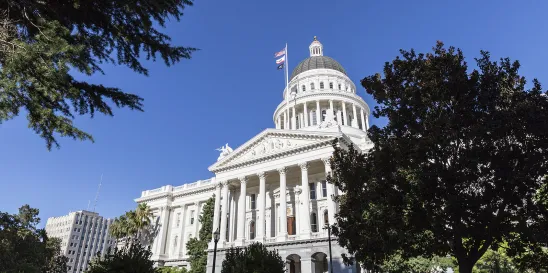With the holiday season in full swing and 2024 rapidly approaching, we thought now would be a good time to remind employers of the “gifts” given to them by the California Legislature in 2023 that become effective in 2024. This past year brought several new laws with it that require employers’ attention, including new leave laws, new protected classes, new workplace safety laws, further non-compete prohibitions, minimum wage changes, and several more. We “unwrap” and summarize those “presents” below.
SB 616 – Expanded Paid Sick Leave: Under SB 616, the annual amount of paid sick leave is increased from three days (24 hours) to five days (40 hours). It also raises the minimum accrual cap from 48 hours to 80 hours. Additionally, the new law preempts local ordinances that do not provide at least the same protections as the state law.
SB 848 – Reproductive Loss Leave: Under this new law, employers must provide employees upon request with five days of unpaid leave after suffering a reproductive loss. Employees may use paid sick days, vacation or other paid time off during the leave, which does not need to be taken on consecutive days. Reproductive loss events are broadly defined and include failed adoption, miscarriage, stillbirth, and unsuccessful assisted reproduction. The leave is also broad in scope in terms of persons covered, but generally covers individuals who would have been the parent of the child, regardless of relationship status.
AB 1076 & SB 699 – Additional Non-Compete Restrictions: California has for many years strictly prohibited agreements that restrain a person from engaging in any lawful profession, trade or business (also known as non-compete agreements). AB 1076 and SB 699 expand and clarify this law by expressly stating that non-compete agreements in the employment context are void, no matter how narrowly tailored and regardless of where or when the agreements were signed, including in another state. The new laws expressly bar employers from entering into non-compete agreements and from seeking to enforce void non-compete agreements against employees. By February 14, 2024, employers must also notify current and former employees employed after January 1, 2022 who have entered into any non-compete agreements that such clauses or provisions are void. Employees may also bring a private action for a violation and seek injunctive relief, damages, or both, and a prevailing employee may recover reasonable attorneys’ fees and costs.
AB 2188 & SB 700 – Cannabis Drug Testing and Inquiry Restrictions: The Legislature actually passed AB 2188 in 2022, but made it effective on January 1, 2024. The new law prohibits employers from discriminating against employees and job applicants based on the individual’s “use of cannabis off the job and away from the workplace.” The law also prohibits employers from discriminating against employees and applicants based on drug tests that detect non-psychoactive cannabis metabolites in their system. This is because such tests only determine whether the individual has used cannabis in the past, as opposed to determining whether the individual is currently impaired. Scientifically valid drug screens that test for active THC, such as certain oral fluid tests, are permissible. In a corollary to AB 2188, this year, the Legislature enacted AB 700, which expressly prohibits an employer from requesting information from an applicant for employment concerning prior cannabis use, subject to some limited exceptions. The new laws do not apply to building and construction trades, and certain jobs that require a federal background investigation or security clearance pursuant to U.S. Department of Defense regulations. Nor do they preempt state and federal laws or regulations that require applicants or employees to be tested as a condition of employment, receiving federal funding, or entering into a federal contract.
SB 553 & 428 – New Workplace Safety Laws: SB 553 requires employers to institute a workplace violence prevention plan by July 1, 2024. Among other things, the plan must contain reporting and investigation procedures, as well as procedures on how to respond to actual or potential workplace violence emergencies. Employers are also required to create and keep records of workplace violence incidents. SB 428 also expanded the circumstances under which an employer could obtain a restraining order to include harassment.
SB 365 – No Automatic Stay: Under SB 365, an appeal from a ruling denying a motion to compel arbitration no longer carries with it an automatic stay of the proceedings in the trial court. This means that the lawsuit in the trial court can proceed while the appeal is pending.
SB 497 – Presumption of Retaliation: This new law creates a rebuttable presumption of unlawful retaliation if an employer takes adverse action against an employee within 90 days of the employee engaging in protected activity, such as complaints about wage and hour violations or equal pay violations. The law also expands the penalties available under California’s general whistleblower retaliation statute to $10,000 per employee, per violation.
SB 723 – Expansion of Rehire Rights in Hospitality: Current law requires employers in the hospitality industry to offer certain hospitality employees open positions after being laid off for a reason related to the COVID-19 pandemic. The law was set to expire on December 31, 2024, but this bill extends it to December 31, 2025. This bill also creates a presumption that a separation on or after March 4, 2020 due to a lack of business, reduction in force, or other economic, non-disciplinary reason was related to the COVID-19 pandemic, unless the employer establishes otherwise by a preponderance of the evidence. The hospitality industry includes hotels, private clubs, event centers, airport hospitality operations, airport service providers, and building services providers (janitorial, building maintenance, or security services).
AB 1228 & SB 476 – Fast Food Industry Changes: Under AB 1228,large fast food employers will start the new year with a requirement to raise their minimum wage to $20 per hour for hourly workers and also their minimum salary for exempt workers to $83,200. Under SB 476, employers must also reimburse their workers for the costs associated with obtaining their food handler card and pay their employees for the time associated with obtaining the card.
SB 525 – Health Care Worker Minimum Wage: The Legislature enacted this bill with the ultimate the goal of gradually increasing the minimum wage for health care workers to $25 per hour by June 1, 2026. The first incremental increase above the state minimum wage will take effect on June 1, 2024 to either $18, $21 or $23 per hour, depending on the size and type of employer. Notably, these minimum wage increases also impact the minimum salary needed to qualify as exempt from overtime. More specifically, the exemptions can be met by paying a salary of 150% of the minimum wage for health care workers or 200% of the state minimum wage, whichever is greater.
General Minimum Wage/Salary Increases: Often lost in the myriad of changes each year are general minimum wage increases. This year is no different. Effective January 1, 2024, California raises its minimum wage for non-exempt employees to $16.00 an hour. This increase will also raise the minimum salary required to qualify as exempt from overtime for most employees in California to $66,560. Also effective January 1, 2024, the minimum salary for computer software employees will be increased to $115,763.35. Licensed physicians and surgeons must be paid a minimum of $101.22 an hour in order to be exempt from overtime. Not only should employers be aware of the above changes, but they should also review the local laws where they do business, because certain cities require a minimum wage that is higher than the state minimum wage (such as San Francisco, Oakland, Emeryville, West Hollywood, San Jose, Santa Monica, Los Angeles, and San Diego to name just a few!).
AB 594 – Public Prosecution of Labor Code Violations: And last, but not least, AB 594 permits public prosecutors to enforce the California Labor Code against employers. Public prosecutor is defined as the Attorney General, a district attorney, a city attorney, a county counsel, or any other city or county prosecutor. The law also expressly states that arbitration agreements do not apply to any action brought by the public prosecutor, so employers must defend such actions in court. This change in the law further underscores the importance of compliance with California’s wage and hour laws.



 />i
/>i

